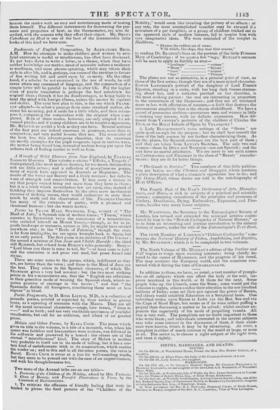A Wreath of' Wild Flowers from New England, by FRANCES
SARGENT OsGOOD. This volume contains " Elfrida, a Tragedy. ;" distinguisbed, like most modern dramas, for too much declamation and too little act ion ; and a collection of miscellaneous poems, many of which have appeared in Annuals or Magazines. The merits of the writer are fluency and a lively manner ; her defects, want of strength and concentration. It may seem a truism to say that people cannot bring out more than they have in them ; but it is a truth which nevertheless few act upon, else, instead of thinking they improve themselves by the often mere mechanical exercise of making verses, they would endeavour to store their minds by study and the observation of life. FRANCES OSGOOD has many of the externals of poetry, with a pleasant and chastened humour ; but she wants matter.
Poems by FRANK HALL STANDISH, Esq., consist of " The Maid of Jaen," a Spanish tale of modern times ; "Timon," which narrates in Spenserian verse the conversion of a misanthrope, who secluded himself on Mount Tauris,—though, as far as re- gards landscape or manners, nature or life, he might have resided anywhere else ; in the " Bride of Palencia," though the story is far from intelligible, we are again brought back to Spain, but at an early period. The first poem is an imitation of The Giaour ; the second a mixture of Don Juan and Childe Harolde ; the third still Byronish, but echoed from BYRON'S tales generally. Story- " Lord bless you there is none to tell, Sir "—at least none is told ; and the execution is not prose run mad, but prose forced into rhyme.
There are some notes to the poems, which, indifferent as they are, are better than the verse ; and those to the Maid of Jaen are the best. They relate to the Spanish character, of which Mr. STANDISH gives a very bad account : but the two most striking points in his cAnmentaries are, that the " English are ridiculous in their graceless mode of wearing the Spanish cloak, which re- quires practice of carriage in the bearer ; " and that " the Spaniards dislike all foreigners, considering them more or less impure" in blood.
Poetic Fragments, by D. Ross LIETCH, M.D., is a collection of juvenile poems, printed or reprinted by their author in graver years, as a squaring of accounts with the Muses. They are all of the usual occasional character,—songs, love verses, " lines to --" and so forth ; and are very creditable specimens of youthful versification, but call for no criticism, and admit of no greater praise.
.Meloia and Other Poems, by ELIZA. COOK. The poem which gives its title to the volume, is a tale of a monarch, who, when his queen was faithless and his courtiers were traitors, was followed in his self-exile and preserved by a hound : the others are of' the eternal " miscellaneous" kind. The story of Melaia is neither very probable in itself nor in its mode of telling, but it has a cer- tain kind of melodramatic trick in its construction, which carries the reader on; and in this and in all the other poems, the verse is fluent. Esiza COOK is never at a loss for well-sounding words, but they seem to be poured out with the ease of an improvvisatore, and with his thoughtlessness too.


























 Previous page
Previous page